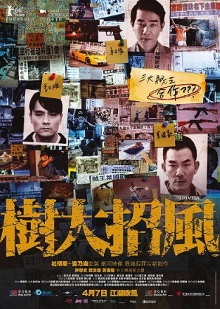
It feels like it’s been ages since the last time I watched a proper, mainstream Hong Kong film while at the same I’ve had plenty of posts on this blog about Taiwanese and Mainland Chinese films. That is of course a reflection of the territory’s fading prominence. Just as China is becoming an economic center of the world so too is it slowly becoming a cultural center as well just as other superpowers before it have done. So it’s very apropos that this is precisely the theme of Trivisa, a film that was produced by Johnnie To but directed by a trio of first-time directors Frank Hui, Jevons Au and Vicky Wong.
In 1997, Kwai Ching-hung, Yip Kwok-foon and Cheuk Tze-keung are three of the most notorious mobsters in Hong Kong. Cheuk has amassed a fortune through kidnappings and though the police know who he is, they are unable to arrest him as his victims are too terrified of him to press charges. Despite his wealth, he has grown bored and wishes to pull off one more great heist. Yip is a violent robber but discovers that he can make more money smuggling electrical goods to the mainland. However he becomes frustrated as he needs to keep grovelling in front of corrupt mainland officials. Kwai does only small-time robberies but is the most mysterious of the trio as he tends to kill anyone who knows his identity. One day a rumor starts spreading all three has been seen together in the same restaurant and that they are planning a grand heist. Cheuk becomes obsessed with the idea and tries locating the other two. Eventually the other two, faced with their own troubles, get back in touch with him.
Since this was a recommendation from our cinephile friend, I knew it couldn’t be ordinary. Yet for the longest time I was put off by how it seemed like a bog standard Hong Kong triad film. The fact that it’s set in 1997, as you’re constantly reminded by old footage of the handover process to China, helps mitigate how old-fashioned all this feels but that doesn’t make it look any more impressive. Eventually however it dawned on me that this is precisely the film’s point. The era when gangsters seemed cool and glamorous is long gone. Earning money through robberies and kidnappings feels crude and small-time when you could be making real bank through real estate deals or on the stock market. When Kwai hires a couple of henchmen from China, coasting on his old reputation, they even comment about how robbing a goldsmith’s shop feels like a petty crime that’s barely worth their time. Each of the main characters has their own reasons to go back to doing what they used to do: Cheuk because he relishes his name as one of the King of Thieves more than the money itself; Yip because he is tired of having to kowtow to Chinese officials and wants to be a feared boss in Hong Kong again; Kwai because it is the only skill he has. Yet the fact is that they are ancient dinosaurs and the world has passed them by.
Of course this is really also saying that Hong Kong’s glory days are behind it. Remember when a recurring joke in Hong Kong movies was making fun of provincial mainlanders? These days it is the territory that is on the back foot, feeling quaint and stagnant compared to the most happening cities in China. I think it’s telling that Kwai’s old henchman is now married to a Thai girl, has a daughter and is doing odd jobs to make ends meet. Hong Kong has come down in the world and it’s time to face facts. Naturally what goes for Hong Kong as a whole naturally also goes for Hong Kong cinema and indeed its entire entertainment circle. This is what makes Trivisa a poignant film to watch in the here and now.
Unfortunately as much as I admire the conception of this film, its actual execution leaves something to be desired. Jordan Chan provides laughs and entertainment value as the showman Cheuk and Gordon Lam is dependably broody as Kwai. However Richie Jen is horribly miscast as Kwai. While it is amusing to briefly see the mean version of Jen, he is so much more at home as his usual meek self in the China scenes that his character doesn’t work at all. What’s more is that Jen is Taiwanese and sounds it, so that rather detracts from the film’s wider themes. Apparently at least part of this story is adapted from real life so for all I know maybe one of these three gangsters really was Taiwanese but taking some artistic license here would still have worked better. The other thing is that even after all these years Jen still can’t act. I don’t even know what he is doing here. I’m also not sure how this was directed by three different, completely new directors. Did each of them perhaps direct the scenes of each of the three main characters? I can believe that as they are tonally rather different one from another. Cheuk for example appears to live in a world in which the police are far less competent than that of the other world. That would make for another point against this film.
I have to admit that the film rose above my poor initial impression of it to be a significant work that is worth watching. I really do like how it uses triads, so closely associated with Hong Kong’s image, in order to say that the territory is now passé. Yet its flaws prevent me from truly liking it. It’s clever and quite interesting but not really good.